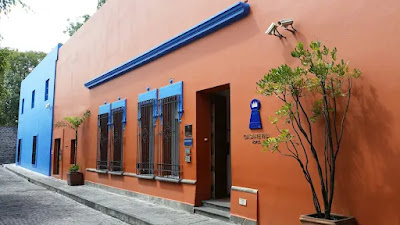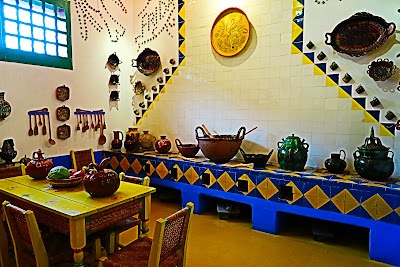I have put together a phenomenal nine day guided tour
Puebla City and Mexico City
June 2025
Helping me on this tour is Rick Hall. Rick has helped me with a few of my previous tours and he was recently selected by the Mexican Cultural Institute of Artisans to be a judge at all the expositions in the state of Michoacan! He is a perfect choice for this honor for he has worked directly with numerous artisans in central Mexico over the past 40 years and his personal folk art collection is museum quality. Rick helped me with my last tour to Mexico City and his knowledge of the history, artisans, the city, etc., was remarkable!
The first part of the tour starts in Puebla. We will fly directly from Denver to Houston and then on to Puebla.
It was originally the ruins of 16th, 17th and 18th century homes before
famed Mexican architect, Ricardo Legorreta re-created this gorgeous
space, fusing old world and contemporary Mexico together.
Puebla is a colonial town loaded with Renaissance and
Mexican Baroque architecture.
A city famous for mole poblano, chilies en nogada, excellent dining and Talavera pottery.
The first morning will be a walking tour of the historic center starting in the zolcal0
which is bordered on three sides by the original broad stone arcaded buildings (called portales).
and on the south side is the Cathedral. The Cathedral, considered by many as one of the most beautiful in all of Mexico, was completed in 1648 with bells only in one tower with one bell weighing 8.5 tons.
A visit to the Ex-Convento Santa Rosa, converted into a museum to display crafts produced in the state of Puebla. The above is the former kitchen at the convent constructed with talavera tiles filled with huge caldrons and other earthenware utensils. It is legend that the Dominican nun, Sor Andrea d la Asuncion, created the famous Mole Poblano.
A
special guided tour at the renown , Talavera de Luz, a famous talavera
pottery workshop where we will witness the whole production of the
talavera pottery.
A city famous for mole poblano, chilies en nogada, excellent dining and Talavera pottery.
The first morning will be a walking tour of the historic center starting in the zolcal0
which is bordered on three sides by the original broad stone arcaded buildings (called portales).
and on the south side is the Cathedral. The Cathedral, considered by many as one of the most beautiful in all of Mexico, was completed in 1648 with bells only in one tower with one bell weighing 8.5 tons.
A visit to the Ex-Convento Santa Rosa, converted into a museum to display crafts produced in the state of Puebla. The above is the former kitchen at the convent constructed with talavera tiles filled with huge caldrons and other earthenware utensils. It is legend that the Dominican nun, Sor Andrea d la Asuncion, created the famous Mole Poblano.
Along with some other tallers noted for their large cazuelas.
A stop at the Museo Bello with its eclectic collection of over 2,500 pieces of furniture, decorative arts, talavera pottery all collected by Mariano Bello, a 19th century industrialist who owned cigar and textile factories.
One morning we will spend at the International Museum of the Baroque designed by Japanese architect Toyoo Ho. Not only is the exterior architecture breathtaking, the interior exhibitions are some of the best I have seen in a long time.
A stop at the Museo Bello with its eclectic collection of over 2,500 pieces of furniture, decorative arts, talavera pottery all collected by Mariano Bello, a 19th century industrialist who owned cigar and textile factories.
One morning we will spend at the International Museum of the Baroque designed by Japanese architect Toyoo Ho. Not only is the exterior architecture breathtaking, the interior exhibitions are some of the best I have seen in a long time.
Then off to the Great Pyramid of Cholula, the largest known pyramid in the world. Construction started in the 3rd century B.C. and the temple on top was added by Spaniards in the 16th century. Behind it stands Popocatépetl, an active volcano & the second highest peak in Mexico.
A stop at the lavish Church of Santa María Tonantzintla, valued for its decoration in what is called folk or indigenous Baroque. You will not believe how elaborate the interior is.
Visits
to the Museo Casa del Dean, a Renaissance-style home built in 1580 with
phenomenal antique frescoes. A stop at the Casa de Cultura, formerly
the archbishop's palace with a facade adorned of bricks and tile. Up a
flight of marble steps to the second floor, you will encounter the
Biblioteca Palafoxiana, the oldest library in the Americas.
Dining in Puebla is some of the best. One night we will dine at El Mural de Los Poblano, shown above. And much more...
Our
private van and driver will pick us up at our hotel in Puebla and we
will be chauffeured to an old gem of a hotel, Hotel Geneve, right in the
heart of the
historic center of Mexico City. Dining in Puebla is some of the best. One night we will dine at El Mural de Los Poblano, shown above. And much more...
and Art Deco with Aztec influences interior where the second floor walls are lined with murals from artists of the Mexican Muralist Movement, Rivera, Siqueros, Orozco...
In the pretty Coyoacán neighborhood, we will dine one day at Los Danzantes overlooking the Jardin
Centenario with the handsome fountain with coyote figures.
Frida's colorful kitchen at Casa Azul.
and the Templo Mayer, the site of the Aztec teocalli (sacred city).
A visit to the National Palace, the former site of Hernan Cortes’ residence.
The most interesting feature of this Renaissance building is the great mural by Diego Rivera depicting the history of Mexico along with countless other murals on the second floor.
A stop at the Palacio de Correos de Mexico (the central post office) built in 1907 is quite spectacular with its eclectic architectural styles. Pretty amazing.
The Palacio de Iturbide is one of the best colonial, Baroque buildings in the city. Built around 1780, it was once the home of Augustin de Iturbide, the first emperor to Mexico after Mexico's independence from Spain. Later it was a convent, a college and then a hotel before Banamex purchased it. It re-opened as the “Palacio de Cultura Banamex” and today it hosts numerous temporary art exhibitions, as well as art workshops for adults and children. The last exhibition was out of this world, who knows what will be in store for us in June.
A visit to the National Palace, the former site of Hernan Cortes’ residence.
The most interesting feature of this Renaissance building is the great mural by Diego Rivera depicting the history of Mexico along with countless other murals on the second floor.
A stop at the Palacio de Correos de Mexico (the central post office) built in 1907 is quite spectacular with its eclectic architectural styles. Pretty amazing.
The Palacio de Iturbide is one of the best colonial, Baroque buildings in the city. Built around 1780, it was once the home of Augustin de Iturbide, the first emperor to Mexico after Mexico's independence from Spain. Later it was a convent, a college and then a hotel before Banamex purchased it. It re-opened as the “Palacio de Cultura Banamex” and today it hosts numerous temporary art exhibitions, as well as art workshops for adults and children. The last exhibition was out of this world, who knows what will be in store for us in June.
A visit to Museo Diego Rivera Anajuacalli, one of the most interesting structures in the city to house a museum. Built out of volcanic rock, it contains Rivera’s astounding collection of over 56,000 pieces of Mesoamerican art. You will also see many mosaics on the walls and ceilings, based on Rivera’s original designs, that depict the gods and goddesses of the pre-Hispanic times.
Comida
one day at Contramar, famous for their fish and the decor is
spectacular. I love the brilliant blue wall along with the ceiling
being covered in the Mexican straw mats, los petates. It's a popular
place. Author and Chef Rick Bayless just featured Contramar and the San
Angel Inn in his latest PBS series of, Mexico, One Plate at a Time with Rick Bayless. Check it out, Season 12, Episode 6.
A full morning at the Museo Nacional de Antropolgia which houses a world-renowned Pre-Coloumbian collection. The museum’s large, central patio is almost covered by a 275 foot canopy which sits on a 36 foot pillar, the largest concrete structure in the world supported by a single pillar. Now that is what I call a fountain!
The collection in beyond description. Not only is the collection magnificent, the building and gallery spaces are spectacular.
Cena (dinner) at Los Limosneros, a lovely restaurant that puts a contemporary twist on traditional Mexican cuisine. The walls of this old structure date back to 500 years, part of the fortified walls built back in the days.
We will have a relaxing afternoon, touring and dining on one of the colorfully painted trajinera boats
at the floating gardens (Chinampa) in Xochimilco. Xochimilco, meaning “Place of the Flowers” in Nahuatl is famous for its Aztec-made waterways surrounding the ancient city of Tenochtitlan, which is now modern Mexico City.
Our last night we will have a leisurely dinner at the San Angel Inn. The San Angel
Inn is a long-standing, venerable institution in Mexico City. Set in a
classic, old hacienda (originally a convent), the atmosphere is elegant
with blue-and-white Talavera-style place settings and bright white table
linens—it has a true Spanish-Mexican colonial feel and is an oasis of
calm in the middle of city. A special place I have been coming to for over 45 years.
A stop at Juan O'Gorma's most lasting creation was the Library of the National Autonomous University of Mexico, which he designed and built in the early 1950s and which has been given UNESCO World Heritage status. The surface is entirely covered with millions of stones chosen by him for their individual colors, and sourced from various regions of Mexico.
A full morning at the Museo Nacional de Antropolgia which houses a world-renowned Pre-Coloumbian collection. The museum’s large, central patio is almost covered by a 275 foot canopy which sits on a 36 foot pillar, the largest concrete structure in the world supported by a single pillar. Now that is what I call a fountain!
The collection in beyond description. Not only is the collection magnificent, the building and gallery spaces are spectacular.
Cena (dinner) at Los Limosneros, a lovely restaurant that puts a contemporary twist on traditional Mexican cuisine. The walls of this old structure date back to 500 years, part of the fortified walls built back in the days.
We will have a relaxing afternoon, touring and dining on one of the colorfully painted trajinera boats
at the floating gardens (Chinampa) in Xochimilco. Xochimilco, meaning “Place of the Flowers” in Nahuatl is famous for its Aztec-made waterways surrounding the ancient city of Tenochtitlan, which is now modern Mexico City.
TRAVEL THE AGES...
FROM THE COLONIAL TOWN OF PUEBLA
TO THE LAVISH CULTURE OF MEXICO CITY
June 2025
robindsg@aol.com






























.JPG)






No comments:
Post a Comment